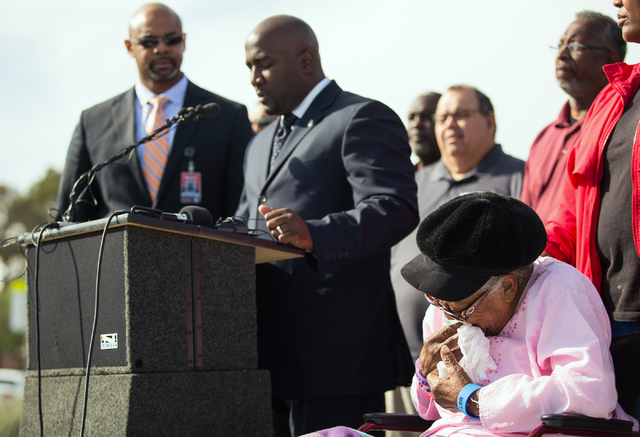Two more members of police oversight committee acknowledge ‘legitimate questions’
Pointed questions about the legality and transparency of the Metropolitan Police Department’s arbitration process have drawn the attention of more members on the department’s oversight committee.
The first to ask tough questions was Clark County Commission Chairman Steve Sisolak, a member of the department’s Fiscal Affairs Committee, which has representation from city and county officials.
The outcome of the binding award, which will cost the department $6.9 million more in pay and benefits for police officers, might not change, despite straying from Nevada law. But work could begin to keep arbitrations from unfolding illegally in the future.
The Fiscal Affairs Committee oversees the budget and finances of the Police Department.
Two sides negotiating public employee contract renewals turn to binding arbitration when they can’t settle the matter.
Two other members of the five-member committee agree that the arbitration process needs a look. County Commissioner Larry Brown and Las Vegas Councilman Ricki Barlow said the group needs to examine its arbitration process, with an eye toward keeping it within the parameters of the law.
“I think there’s some legitimate questions that have been raised as far as the process, and, over the next week or so, I’m sure those questions will be answered,” Brown said.
Much is at stake. Called into question is the legality of an arbitration that gave Las Vegas police officers a $6.9 million award in cost-of-living pay raises and higher employer contributions to health insurance plans.
The award gave two separate 0.75 percent cost-of-living increases, one retroactive to July and the other starting in January. Employer contributions to health insurance plans increased by 13.46 percent under the award.
Sisolak has suggested that the outcome possibly was what both parties wanted all along, with the arbitration providing Clark County Sheriff Doug Gillespie cover from giving raises as he sought a sales tax increase from county commissioners for hiring officers.
At the least, Sisolak has suggested, the Police Department didn’t put the strongest effort forward.
Gillespie has strongly pushed back against any suggestion that the award was a done deal before arbitration began.
Like Brown, Barlow doesn’t believe the arbitration award was improperly arranged. However, he agreed with Sisolak’s assessment that the state law wasn’t followed.
“The commissioner is spot on,” Barlow said. “I don’t believe that the arbitrator carried out the statute to the rules.”
Last week, the county’s legal counsel, Mary-Anne Miller, authored a review that found deviations from Nevada law throughout the arbitration process. It addressed several issues, from how the sides agreed on an arbitrator, to a glaring lack of required documentation, such as written last, best offers between both parties.
Before the review came out, Gillespie strongly defended his department and the arbitration process at a news conference, declaring that the rules were followed.
After the Review-Journal emailed him a copy of the county attorney’s review and requested comment, Gillespie declined to comment until he talks it over with the Fiscal Affairs Committee.
Gillespie also referred a reporter to his public information office. Department spokesman Bill Cassell said it would be inappropriate to comment before the next Fiscal Affairs meeting.
That is scheduled for Oct. 28.
Sisolak points to ‘RED FLAGS’
For his part, Sisolak stresses that the rules and law must be followed with an eye toward transparency.
To make his case about the arbitration not being up to snuff, he has pointed to “red flags” throughout the process involving the Police Department and the Las Vegas Police Protective Association, which represents police officers.
They include:
■ Robert Smith, the department’s Chicago-area attorney, recommended an arbitrator, Robert Perkovich, also from Chicago, after both sides rejected a panel of seven candidates without narrowing the list down. Under state law, each side strikes down a name until one remains. That didn’t happen.
■ The last, best offers from both sides weren’t made in writing, which is contrary to state law. Instead, the final offers were verbal.
■ The arbitrator’s award failed to provide details required under state law, including whose offer was picked and making the case that the Police Department can afford to pay the award. A follow-up effort by the arbitrator also failed to meet the law’s requirements, according to the county attorney’s review.
■ The Police Department and union opted against having a transcript prepared of the three-day hearing. They also waived the court reporting of final arguments in support of their last, best offers, a violation of state law.
■ Sisolak also questions the wording of an email Smith sent to the Police Department with the initial Sept. 23 award.
“Attached is the award from Arbitrator Perkovich, which we just received in today’s mail,” Smith wrote in the email, obtained by the Review-Journal. “It is as we expected.”
The last sentence caught Sisolak’s eye. Given that the attorney expected the decision, he said, it suggests the department made a poor effort to position the department for a win. At worst, it shows the parties intended the decision all along, Sisolak said.
Smith didn’t respond to a request for comment.
Sisolak said the dollar amount of the award isn’t the issue; it’s the process.
He also said the police union has the right to put its best foot forward in arbitration.
“I just want people to acknowledge there was some breakdown in what happened and we’re going to be putting these safeguards in place,” Sisolak said.
Aside from the upcoming meeting, Sisolak is waiting for a transcript to be made of the three-day arbitration hearing.
Brown, noting that there were several months of labor negotiations, said: “If there were errors made, I don’t believe it was with intent.”
But he anticipates a discussion about potential improvements for the future.
“One of the things that is going to come out of this whole arbitration discussion is: Do we need to do things differently?” Brown said. “I think it benefits everyone in the long run.”
MEETING LAW LOOPHOLE
The discussion also is complicated by another factor: The committee doesn’t tape its closed-door meetings.
That means there is no precise record that Sisolak and Gillespie can turn to for resolving their differences and comparing alternate versions of the parameters.
The two disagreed on the boundaries given to the sheriff for health insurance offers.
The last, best offer from the Police Department, which increased the employer contribution by 13.46 percent, is more than Sisolak believes the committee authorized.
The contribution increased from $8,572.73 per employee to $9,726.62 annually.
If the closed meetings had been recorded, officials would have a record to check.
“I don’t ever remember seeing anybody taking notes or recording it,” Sisolak said.
In general, the Nevada open meeting law governing public bodies requires all meetings, open and closed, to be recorded with audio or transcribed by a court reporter.
However, under the state law that officials used to meet in private, there is no requirement to keep a record. That law is for a governing body of a government entity meeting with its management representatives.
The situation falls under the section of labor laws for government agencies, not the open meeting law.
Barry Smith, executive director of the Nevada Press Association, which represents newspapers in the state, said this instance is a good example of why the law for government meetings shouldn’t have loopholes.
“Now there’s disagreement about what went on in a closed-door meeting, and there’s no record of it, and that’s why we shouldn’t have loopholes like this in the law,” he said.
The Police Department on Friday wouldn’t answer a question from the Review-Journal asking if minutes are kept of the committee’s executive session meetings.
UNANSWERED QUESTIONS
Questions remain unanswered about the arbitration, such as why the Police Department relied on a Chicago-area law firm for work that demands an understanding of Nevada law.
Or why the two parties wouldn’t narrow an arbitrator from a panel of seven options, and instead tapped someone from Chicago.
Or why a well-experienced arbitrator strayed from the law’s requirements not once, but throughout the process, according to the county attorney’s review.
Perkovich would not discuss the arbitration, citing ground rules both sides stipulated that close the matter off to reporters.
The Police Department on Friday wouldn’t answer questions from the Review-Journal about why it picked people in Chicago for the job, if they are qualified, or say if the law was followed.
The department also didn’t answer a question about how much the arbitration and legal work will cost taxpayers.
On paper, Perkovich looks good. He has three decades of labor law and arbitration experience.
A 1981 graduate of John Marshall Law School in Chicago, he has credentials of handling arbitration cases involving police and fire departments, school districts and cities in Illinois.
Perkovich has enjoyed a high profile in Illinois labor circles.
In 1984, Perkovich became the first executive director of an Illinois state board that administers labor laws for educators. He did that job until 1991.
In 2003, Perkovich was named the director of a training center at the prestigious DePaul University Dispute Resolution Center in Chicago. The university’s press release announcing his arrival called him a “seasoned arbitrator.”
He has since left that post.
More recently, Illinois Labor Relations Board records show he handled four arbitration cases in his home state since January. His written opinions in those cases show more attention to detail and depth compared to what Clark County taxpayers got.
For example, in an Illinois case involving city police union negotiations, Perkovich included an analysis showing a comparison of wage increases to other cities and the reasons that the law allows him to consider this information.
No such analysis was provided in his written decision to hand wage increases to the Police Department. Nevada law for decision-making calls for the consideration of compensation to other government employees within the state and out of state.
OPEN OR CLOSED?
The unfolding questions have captured attention in the business community.
In an interview, Brian McAnallen, vice president of government affairs at the Las Vegas Metro Chamber of Commerce, said his organization has concerns about how the process was handled.
“We’re very dismayed about what we feel is a blatant avoidance of following Nevada statute by the arbitrator and even how the arbitrator may have been selected,” he said.
McAnallen said it’s a poor outcome for taxpayers and the business community.
“We’re on the hook for $6.9 million in a process that doesn’t even follow state law,” he said. “This is not a good situation for any of us.”
McAnallen said the system could be improved by making arbitration hearings open to the public to add transparency.
The hearings, the basis for decisions that entail millions in taxpayer dollars, are not open to the public under state law.
Jeff Zaino, vice president of the New York-based American Arbitration Association, said arbitration is intended to be private. The national organization is one of two recognized groups in Nevada that provides panels of arbitrators.
By being in private, he said, participants can avoid “showboating” and efficiently get down to resolving differences.
“People act differently behind a camera,” he said. “People act differently with an audience.”
Contact reporter Ben Botkin at bbotkin@reviewjournal.com or 702-405-9781. Follow him on Twitter @BenBotkin1.


















